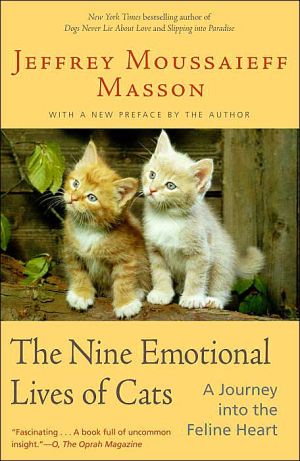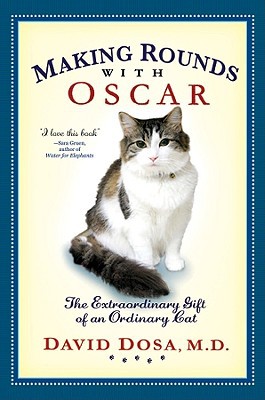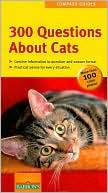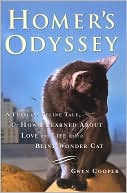The Nine Emotional Lives of Cats: A Journey into the Feline Heart
Drawing from literature, history, animal behavioral research, and the wonderful true stories of cat experts and cat lovers around the world, Jeffrey Moussaieff Masson vividly explores the delights and mysteries of the feline heart. But at the core of this remarkable book are Masson’s candid, often amusing observations of his own five cats. Their mischievous behavior, aloofness, and affection provide a way to examine emotions from contentment to jealousy, from anger to love. The Nine Emotional...
Search in google:
Drawing from literature, history, animal behavioral research, and the wonderful true stories of cat experts and cat lovers around the world, Jeffrey Moussaieff Masson vividly explores the delights and mysteries of the feline heart. But at the core of this remarkable book are Masson's candid, often amusing observations of his own five cats. Their mischievous behavior, aloofness, and affection provide a way to examine emotions from contentment to jealousy, from anger to love. The Nine Emotional Lives of Cats will captivate readers with its surprises, offering a new perspective on the deep connection shared by humans and their feline friends. Publishers Weekly Prevailing wisdom holds that cats are aloof, smug, quintessentially distant-especially when compared to dogs-but Masson, in his latest exploration of feelings in the animal world, argues otherwise: "cats," he says, "are almost pure emotion." He establishes nine basics (narcissism, love, contentment, attachment, jealousy, fear, anger, curiosity and playfulness) and, in nine casual and sometimes digressive chapters, suggests when and why cats feel each of them and how we humans might better understand our pets as a result. In the tradition of his bestselling Dogs Never Lie About Love, Masson's exploration is a warm fuzzy to the feline world: in observing the antics of his five cats (Miki, Moko, Yossie, Megalamandira and Minnalouche), Masson's tone never fails to convey his wonder for "these perfect beings who briefly and softly grace my life." He draws desultorily on history, scientific research and correspondence with cat experts and owners, but most of his book is dedicated to a highly subjective study of his beloved five, who live with him in a New Zealand paradise. Though Masson strains to establish evidence for cats' sophisticated emotional landscape (and in doing so exposes himself to accusations of anthropomorphism), cats are still mysterious creatures, and even a former psychoanalyst such as he must occasionally admit (though with a certain kind of glee) that he cannot entirely figure them out. One thing's for sure: because cats, unlike humans and dogs, have never been pack animals, much of what comes naturally to us-guilt, apology, even rage-is absent in cats. In the end, this appealing book seems as much a portrait of Masson as it is of his enchanting cats. (Nov.) Copyright 2003 Cahners Business Information.
Narcissism\ Moko\ Very different from that faithful animal the dog, whose sentiments are all directed to the person of his master, the cat appears only to feel for himself, to live conditionally, only to partake of society that he may abuse it. —Buffon\ The frustrated woman in The New Yorker cartoon who asks the cat on her chair, “Am I talking to myself?” expects a laugh because the obvious answer is, “Yes, you are,” since cats have no interest in what we say to them. But is this really so?\ Many people are convinced that cats are indifferent to us. Some even go so far as to use the word cold, which is not really descriptive but evaluative. Most cats (of mine, only Minna Girl is a partial exception) will not come when you call them, or rather, they will come sometimes, if they feel like it, and not other times, when presumably they don’t feel like it (unless there are other factors, as yet unknown to us, that decide whether a cat comes or not). This supposed indifference to humans leads some people to conclude that cats are narcissistic—in fact that narcissism is the cat’s defining characteristic. Not only are cats supposed to be narcissistic, they are commonly called haughty, egotistical, egocentric, self-centered, selfish, self-absorbed, egomaniacal, smug, distant, unsociable, and aloof. As for their indifference, the phrase is usually “calculated indifference,” but I doubt anyone would insist that it is calculated at all.\ Narcissists lack the capacity to think about other people, to take the needs of others into consideration, to subordinate their own wishes to those of someone else. They are entirely self-involved. When I was a boy of fifteen, on an ocean liner from New York to London, I somehow struck up a friendship with a man of this description, a well-known American literary critic who was on board—the young admirer and the literary lion—and I spent much of the five days en route in his company. He spoke nonstop, always about himself, his accomplishments, his books, his admirers. It was good talk, fascinating to me at fifteen and evidently to others, for he always had a crowd. However, I knew then, though I did not know the word, that the man was a complete narcissist. He had zero interest in the ideas of anybody else around him or in anything but his own thoughts, which did indeed seem at the time more interesting than those of anyone else present. However, his fine mind could not encompass the one thought that everyone else could not avoid: He was a fool.\ A cat’s narcissism, if that is the word we choose to use, is not like that at all. Cats watch us all the time. Obsessively. Coldly, some would say, or at least with some detachment. They see us; they notice us. Their eyes grow big watch- ing. They do it, some say, because they have to: we represent a superior predator, someone who might do them harm. But no, even when perfectly content, satisfied, completely out of danger, they do it. Cats take us in. We will probably never know what goes through their minds at those moments. What- ever it is, though, it is not self-absorption. The assertion, then, that cats think only about themselves is clearly wrong. Cats watch us so carefully that clearly they are thinking about us. But if we ask whether they think about us in preference to themselves, the answer is probably no.\ Of course, in some sense, all animals, human or other- wise, are narcissistic to a certain degree, if narcissism can be equated with selfishness. Selfishness is built into every living creature, for none would survive without a healthy dose. Are cats more keen on survival than any other creature? It would be a strange claim. Yet cats certainly seem less altruistic than dogs, for example. I would not want to think my life depended on any of my cats. I seriously doubt that they would jeopardize their own safety to save my life. Why should they? (It seems that only dogs will risk their lives routinely, possi- bly because they can understand when a life is in jeopardy, whereas cats do not seem to realize this.) However, sometimes they do seem concerned. When I swim far out to sea at the beach outside my house, the four cats have a tendency to stand at the shoreline and wait for me, gazing out. Are they truly concerned, contemplating a lifesaving maneuver, or just curious? If I began to wave and shout, I doubt my cats would alter their stance.\ The willingness to do something for others may be an inherited trait, common to dogs and humans but unknown to cats, having nothing to do with notions of selfishness. Why have we never heard of a service cat, like a service dog? Ma-jor economies have been driven by almost all the domesti-cated species—dogs (as herders and drovers), goats, sheep, pigs, cattle, water buffalo, horses. Only cats are economically insignificant—probably owing to resistance. Resistance seems an essential characteristic of cats. They resist us. Cats resist even size reduction, which we have practiced with such success on dogs. You do not find cats much bigger or smaller than other cats. They are all more or less the same size. They also resist our calls to come, to move, to obey, to present themselves, to do all the things that dogs do so easily. This drives some people crazy. Cats do not even care that it drives us crazy!\ This is what some people mean when they call cats narcissistic: they will not alter their program to fit ours. It is very difficult to force a cat to do what we want. This seems to be one of the main reasons that many men in particular do not like cats: they cannot be controlled. They will not obey. Even the best-natured cat has an agenda of her own at almost all times. Even when she is doing nothing (although sleeping is hardly nothing), she does so on her own terms. Minna Girl will invariably come when I call her. Except when she will not. I call, she looks back, and then she continues on her way, not the least bit embarrassed or in any other way concerned that she has not done what I have asked. This could never happen with a dog, except under extraordinary circumstances. But for even the best-natured cat, it is an everyday experience. They hear us, they see us, they take in the request, and then they blink it away and to all appearances are completely indifferent. Yossie never does anything I ask; yet he expects me to do everything he asks. He is insistent about his food; “I want it now!” is his usual refrain. My cats are a lot like my five-year-old son, Ilan. “Fair’s fair” is a point of view utterly beyond their grasp.\ I will wake up to see one of the cats and call out, “Miki!”—hoping that he will come bounding to me, rub his nose against my face, purr madly, and in other ways proclaim his pleasure in seeing me. I love morning greetings—two beings demonstrating the joy they feel in seeing one another again after a period of separation. But Miki walks past me without even pausing. All of the cats do this at some point or other. They act as if I were not there, as if I hardly mattered in their lives. Later in the same day, they will be running and playing with me on the beach, their eyes shining with pleasure, clearly delighted we are all together. I am learning to leave my expectations behind and take what comes as it comes. I seem to have no choice with cats.\ Is what looks to us like studied indifference really that, or is it just that we do not entirely understand cat rules of behavior? Cats might assume, for example, that we can read their minds: “Can’t you see I am thinking of something else entirely?”—in which case for us to insist on our own agenda would be impolite from the cat’s point of view. They have something they are intent upon, a place they would rather be, a task they would rather perform, and our insistence that they conform to our plan is simply irrelevant to them. It does not occur to them to obey any request they do not themselves wish to perform or that is not self-generated.\ From the Hardcover edition.
AcknowledgmentsxiIntroductionxiii1Narcissism32Love273Contentment614Attachment815Jealousy1036Fear1277Anger1558Curiosity1799Playfulness205Epilogue235Afterword241Notes244Recommended Reading249Index252
\ From Barnes & NobleBestselling author Jeffrey Moussaieff Masson gives us another brilliant exploration of the animal kingdom with this look at the secretive, playful world of cats. Masson explores feline emotions, debunks myths, and honors the cat's place as a companion to humans.\ \ \ \ \ Publishers WeeklyPrevailing wisdom holds that cats are aloof, smug, quintessentially distant-especially when compared to dogs-but Masson, in his latest exploration of feelings in the animal world, argues otherwise: "cats," he says, "are almost pure emotion." He establishes nine basics (narcissism, love, contentment, attachment, jealousy, fear, anger, curiosity and playfulness) and, in nine casual and sometimes digressive chapters, suggests when and why cats feel each of them and how we humans might better understand our pets as a result. In the tradition of his bestselling Dogs Never Lie About Love, Masson's exploration is a warm fuzzy to the feline world: in observing the antics of his five cats (Miki, Moko, Yossie, Megalamandira and Minnalouche), Masson's tone never fails to convey his wonder for "these perfect beings who briefly and softly grace my life." He draws desultorily on history, scientific research and correspondence with cat experts and owners, but most of his book is dedicated to a highly subjective study of his beloved five, who live with him in a New Zealand paradise. Though Masson strains to establish evidence for cats' sophisticated emotional landscape (and in doing so exposes himself to accusations of anthropomorphism), cats are still mysterious creatures, and even a former psychoanalyst such as he must occasionally admit (though with a certain kind of glee) that he cannot entirely figure them out. One thing's for sure: because cats, unlike humans and dogs, have never been pack animals, much of what comes naturally to us-guilt, apology, even rage-is absent in cats. In the end, this appealing book seems as much a portrait of Masson as it is of his enchanting cats. (Nov.) Copyright 2003 Cahners Business Information.\ \ \ Library JournalMasson, a former Sanskrit scholar and psychoanalyst, is no stranger to the concept of animal emotions or to the best sellers lists. Now he does for the house cat what he did for dogs in Dogs Never Lie About Love, exploring the range of feline emotions and the relationships that take place between cats and humans. What makes his works unique is that he doesn't try to give definitive scientific accounts of animal behavior, complete with definitions and cause/effect; nor does he just recount personal anecdotes. Instead, he takes anecdotal experiences and translates them into enlightened observations that shatter the myths that cats are aloof, independent, and egocentric. In a style similar to that of Elizabeth Marshall Thomas's The Tribe of Tiger, he addresses in each chapter a particular feline emotion (narcissism, love, contentment, attachment, jealousy, fear, anger, curiosity, and playfulness), using the comings and goings of his five cats as examples. Although his argument that dogs and cats should be left to wander the streets and fields at will is a very controversial one, it will not deter people from reading, enjoying, and learning from this book. This should be very popular with cat lovers everywhere, especially those who want something more than a personal account but less than a behavioral treatise. Highly recommended. [Previewed in Prepub Alert, LJ 7/02.]-Edell M. Schaefer, Brookfield P.L., WI\ \ \ \ \ School Library JournalAdult/High School-"Too many people tend to see cats as uncomplicated creatures with few emotions- I am convinced that, on the contrary, cats are almost pure emotion," asserts Masson, a psychoanalyst. In nine chapters, he examines how cats might really be experiencing what we see as "Narcissism," "Love," "Contentment," "Attachment," "Jealousy," "Fear," "Anger," "Curiosity," and "Playfulness." However, although he refers to other experts and includes an excellent bibliography, all this seems more like memoir than science because the author is mostly relating, in a conversational style, his family's experiences with five young cats in their home in New Zealand. Accompanying Masson on daily walks on the beach, having mysterious adventures in the rain forest, or interacting in surprising ways with rambunctious children, the felines are a rich source of fascination, information, and insight. Given the small number of subjects and the short period of observation, Masson arrives at some conclusions and generalizations that many readers are bound to question or disagree with, but the spirit of inquiry is part of the charm of this book. Anyone intrigued by psychology or animal studies should enjoy this title and be inspired to look more closely at the creatures around them.-Christine C. Menefee, Fairfax County Public Library, VA Copyright 2003 Reed Business Information.\ \ \ \ \ Kirkus ReviewsAn exploration into the emotional complexity of cats, with lots of literary references but mostly personal observations, from Masson (Why Elephants Weep, 1995, etc.). What Masson did for dogs in Dogs Never Lie About Love (1997), he does here for cats. As always when considering animal behavior, he admits from the get-go that he's on sketchy ground, making speculations that are intended as food for thought: "We will probably never know what goes through their minds." There are times when readers may wonder why he chose these "primary" emotions to investigate-narcissism, love, contentment, attachment, jealousy, fear, anger, curiosity, playfulness, and a dozen subsidiary states-when he is confounded by a few of them: "Are cats narcissistic? No." Or "Is this jealousy, or is it perhaps some feline rule of etiquette?" But then, much of the time cats are nothing if not inscrutable, as Masson is happy to admit. Their mystery is much of their charm. Yet it's Masson's purpose to offer up considerations of cat behavior. Is their attachment a transference-a nostalgia-for the time when they were kittens? And when it comes to attachment, is it more to the world around them than to their human companions? (Masson believes cats are more fully happy when allowed freedom to roam, a point he presents persuasively, unlike many cat enthusiasts.) Much of what the author has to say is common sense: that cats show fear out of threat (but don't worry; they live in the moment); show contentment from a sense of security (but not happiness: that takes freedom); and can communicate acceptance (purring has been known to lower human blood pressure, perhaps because we have been chosen by one so self-possessed). Anyonewho has ever been owned by a cat will find these speculations engaging, finely tuned, and always with plenty of fond anecdotal evidence as they charge across the species barrier. Author tour\ \








